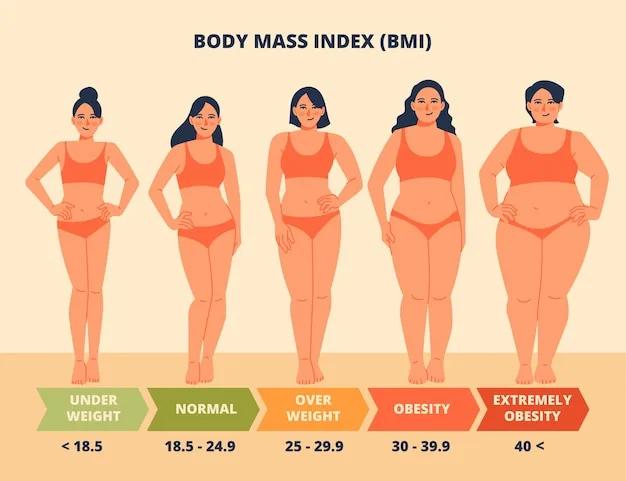
Maintaining a healthy body weight is an important aspect of achieving overall good health. A Body Mass Index (BMI) is a commonly used tool to estimate your body fat percentage and determine if you are underweight, overweight or within a healthy range. While genetics, physical activity levels, and other factors play a role, a healthy diet is a key factor in achieving a healthy BMI. In this blog post, we will explore the importance of diet in achieving and maintaining a healthy BMI.
Understanding BMI
Calculating your Body Mass Index (BMI) may seem complicated at first, but it’s a simple formula that takes into account your height and weight. It’s an important measurement to help you understand your overall health and determine if you are at a healthy weight for your age and height.
The formula for calculating your BMI is your weight in kilograms divided by your height in meters squared(kg/m²). Don’t worry if math isn’t your strongest subject there is an NHS BMI calculator that can do the work for you and provide you with your BMI score in just seconds. By tracking your BMI and making healthy lifestyle changes, you can work towards achieving and maintaining a healthy weight.
NHS guidelines on BMI values
A BMI calculation in the healthy weight range is between 18.5 to 24.9.
For Black, Asian and some other minority ethnic groups, the healthy weight range is 18.5 to 23.
For people of White heritage, a BMI:
- Below 18.5 is underweight
- Between 18.5 and 24.9 is healthy
- Between 25 and 29.9 is overweight
- Of 30 or over is obese
Black, Asian and some other minority ethnic groups have a higher risk of developing some long-term conditions such as type 2 diabetes with a lower BMI. People from these groups with a BMI of:
- 23 or more are at increased risk (overweight)
- 27.5 or more are at high risk (obese)
A person’s BMI is a useful indicator of their overall health, but it is not without limitations. For instance, it does not account for muscle mass or body composition and is not accurate for everyone, such as bodybuilders or pregnant women.
Waist-to-height ratio
You could have a healthy-looking BMI, but still have more belly fat than is recommended for optimal health. Measuring your waist-to-height ratio might be just what you need to determine whether or not you’re carrying excess tummy fat. We often forget the importance of checking our waist circumference measurements, but it’s a key aspect of assessing our overall health.
It’s a simple calculation that involves dividing your waist circumference by your height. A waist-to-height ratio of over 0.5 can indicate that you have excess tummy fat, which can increase your risk of cardiovascular disease, type 2 diabetes, and other health conditions. This ratio is an excellent way to check if your body composition is healthy, or if you need to make some lifestyle changes to improve your overall health.
Why is it important to maintain a healthy BMI?
One of the main reasons to maintain a healthy BMI is that studies have established a clear link between high BMI and various health problems, including diabetes, heart disease, and high blood pressure. People with a high BMI are at an increased risk of developing these chronic diseases than those with a healthy BMI. BMI can also be an essential tool in weight management and reducing the risk of obesity helps individuals establish goals and monitor their progress.
Maintaining a healthy weight noticeably lowers the risk of heart disease. This is because it prevents and manages the risks of other conditions such as high blood pressure, high cholesterol, and type 2 diabetes, which can lead to coronary heart disease. Additionally, being overweight affects us in many ways such as causing aches & pains and making sleeping difficult. You may also lose energy and confidence. Even without any of these problems, it is essential to maintain a healthy weight to avoid them in the future.
Diet and BMI
Maintaining a healthy diet is key to achieving and maintaining a healthy BMI. Your diet can impact your BMI in many ways, such as helping you maintain a healthy weight or leading to weight gain. To maintain a healthy BMI, it’s important to focus on healthy eating habits such as consuming a variety of fruits and vegetables, lean protein, and whole grains, while limiting processed foods and added sugars. Eating a healthy, balanced diet can help you reach your BMI goals and support overall health and well-being. Remember, small dietary changes in your diet can lead to big improvements in your BMI and overall health.
The macronutrients or food groups in your diet, namely carbohydrates, fats, and protein, all impact your weight differently. Protein is the most satiating macronutrient, which means it keeps you feeling fuller for longer by reducing hunger. The right balance of macronutrients, specific to your body’s needs, can aid weight loss and support a healthy BMI.
What are some healthy food options?
Maintaining a healthy eating pattern is key to a wellness-focused lifestyle. However, with the myriad of options available in the market, choosing the right foods can be daunting. Thankfully, there are dietitians and healthcare professionals who can guide us in making informed decisions about what to eat. When putting together a weight loss plan, it is important to consider the number of calories in the foods we consume.
Lean protein sources like chicken breast and fish, vegetables like spinach and broccoli, and fruits like berries and bananas are all excellent healthy food options, that are both delicious and nutrient-dense. A few simple food swaps you can make can make a big difference. One of the key changes you can make is to start replacing saturated fats with unsaturated fats. Instead of reaching for butter, try cooking with olive oil or avocado oil. Swap out fatty meats for leaner protein sources, such as chicken breast or fish. Similarly, you can replace high-fat dairy products with low-fat or fat-free options, like skimmed milk or Greek yoghurt. Making these small changes to your diet can help you achieve a healthier BMI and improve your overall health.
Remember, the goal isn’t just to consume fewer calories, but to fuel your body with high-quality nutrients that will keep you feeling full and energised throughout the day.
Importance of Portion Control
While the types of food you consume play a critical role, the amount of food you eat is equally important. Portion control is an essential element of maintaining a healthy BMI. Consuming fewer calories than your body needs to maintain its current weight is vital for achieving healthy weight loss. But, how can you do that? Here are some tips that can help you: Use smaller plates to trick your mind into thinking you have eaten enough; measure your food using a food scale or measuring cups; avoid eating directly from packages as it can lead to mindless eating. With these simple but effective tips, you can easily incorporate portion control into your lifestyle and maintain a healthy BMI.
Count Your Calories
One of the best ways to regulate your weight is by keeping track of your daily calorie intake. Eating more calories than you burn through exercise and physical activity can result in weight gain. On the other hand, eating fewer calories can lead to weight loss. Therefore, a calorie deficit is needed to lose weight. To achieve this deficit, you need to be mindful of your food choices. Focus on consuming nutrient-dense foods rich in fibre, vitamins, minerals, and protein, and limit your intake of high-calorie, low-nutrition foods.
Keeping track of what you eat, makes you more accountable for the choices you make and helps you become more mindful of what you consume. This can eventually lead to a change in behaviours and eating habits that positively affect your overall health. It may take some time to adjust to this new lifestyle, but by taking it one day at a time and staying patient and consistent, you can achieve your weight goals and improve your well-being.
Hydration and Weight Loss
Staying hydrated is crucial for overall health and maintaining a healthy BMI. Drinking enough water can help prevent overeating and snacking, as thirst can often be mistaken for hunger. It can also improve digestion, boost metabolism and help reduce bloating. Aim to consume at least eight glasses of water daily; add some infused water, herbal teas, or fresh fruit juices to add variety to your hydration regimen.
Maintaining a healthy BMI is critical for health benefits, mental health and overall well-being. A balanced diet, portion control, and adequate hydration are vital for achieving and maintaining a healthy weight. Remember to choose nutrient-rich whole foods, avoid ultra-processed foods and sugary drinks, monitor your portion sizes, and stay hydrated. By following these simple guidelines, you can achieve and maintain a healthy BMI while enjoying delicious, satisfying meals.
Sources
- BMI healthy weight calculator – NHS
- Eating & Physical Activity to Lose or Maintain Weight – NIH
- Healthy weight loss – British Nutrition Foundation
Medical Disclaimer
NowPatient has taken all reasonable steps to ensure that all material is factually accurate, complete, and current. However, the knowledge and experience of a qualified healthcare professional should always be sought after instead of using the information on this page. Before taking any drug, you should always speak to your doctor or another qualified healthcare provider.
The information provided here about medications is subject to change and is not meant to include all uses, precautions, warnings, directions, drug interactions, allergic reactions, or negative effects. The absence of warnings or other information for a particular medication does not imply that the medication or medication combination is appropriate for all patients or for all possible purposes.









